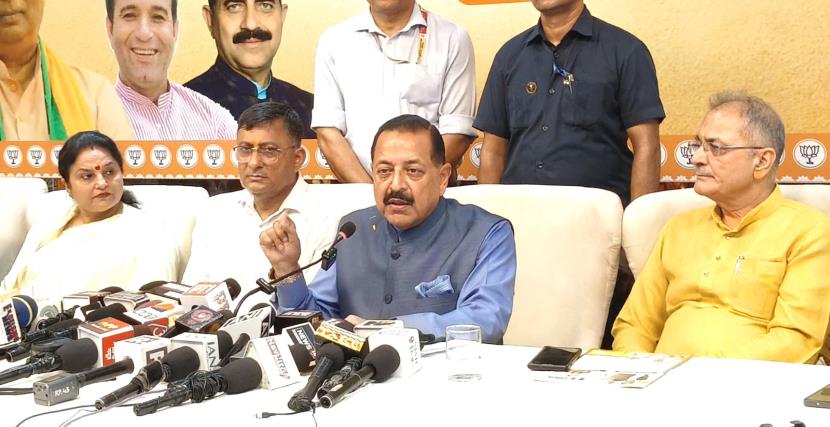11 years of Modi Govt redefined contours of governance: Dr Jitendra

Jun 12, 2025
JAMMU: Union Minister of State (Independent Charge) for Science and Technology; Earth Sciences and Minister of State for PMO, Department of Atomic Energy, Department of Space, Personnel, Public Grievances and Pensions, Dr. Jitendra Singh said the 11 years of the Narendra Modi Government have redefined the contours of Indian governance through a relentless focus on technology, transparency, and the empowerment of every citizen.
Addressing a press conference here today as part of the nationwide outreach programme marking the 11th anniversary of the government, Dr. Jitendra Singh said the achievements of this period stand on four pillars: pro-people schemes, reform-driven decisions, technology-based delivery, and inclusive implementation.
Dr. Jitendra Singh noted that since 2014, the Modi Government has maintained a consistent trajectory of reform, performance, and delivery. Highlighting the early decisions taken in the first few weeks of government formation, he referred to the abolition of the colonial-era practice of attestation of documents by gazetted officers. "This single decision reflected trust in our youth and marked a shift in the government's approach-from suspicion to facilitation," he said.
The Minister also cited the elimination of interviews for non-gazetted government posts as another landmark reform that removed subjective bias and curbed corruption in recruitment. These reforms, Dr. Jitendra Singh pointed out, may appear administrative, but have deep socio-economic impact by levelling the playing field for millions of aspirants across the country.
Touching upon women-centric reforms, the Minister said the government introduced rule changes to allow women officers to avail maternity and other benefits without bureaucratic hurdles. He also highlighted increased participation of women in areas like defence, where they are now eligible for entry into Sainik Schools and active combat roles.
Dr. Jitendra Singh devoted a substantial portion of his address to the use of technology as a governance tool. He said that digital initiatives have not only made processes simpler but have also restored dignity to citizens. As an example, he mentioned the introduction of face recognition for pensioners' life certificate submissions, eliminating the need for senior citizens to physically prove they are alive every year. "Earlier, elderly people were made to stand in queues to prove they were alive. Today, an app-based facial scan completes the process in seconds," he noted.
On the health front, Dr Jitendra Singh said that schemes like Ayushman Bharat have enabled lakhs of poor families to access healthcare services without financial hardship. Complementing this, the rise of Jan Dhan accounts, Direct Benefit Transfer (DBT), and UPI-based transactions has transformed how welfare is delivered and received. "Today, our digital public infrastructure is being recognised globally as a model," Dr. Jitendra Singh said, noting that the use of RuPay debit cards under Jan Dhan Yojana has been cited in international best practices.
The Minister further pointed to the increasing recognition of Indian innovation globally. India's leap in the Global Innovation Index and its emergence as the world's third-largest startup ecosystem were presented as indicators of how the government's policies have nurtured entrepreneurship. Notably, he said that nearly 56% of patents filed in India now come from resident Indian innovators-a significant shift from previous trends when innovation was largely foreign-driven.
Dr. Jitendra Singh also highlighted the implementation of the One Nation One Subscription (ONOS) model in education, where access to research journals and academic content is being streamlined. He referred to the New Education Policy as a structural reform that aligns with India's aspirations and the need to democratise knowledge.
Focusing on housing and water supply, the Minister said that under the PM Awas Yojana, crores of homes have been built for the underprivileged, and under the Jal Jeevan Mission, household tap connections have increased from around 50% to 80%. These are not just statistics, he said, but transformations that have altered daily life in rural and semi-urban India.
Responding to a query on local relevance, Dr. Jitendra Singh said Jammu and Kashmir, too, has witnessed these changes firsthand. From the development of traditional crafts like Kishtwar's wool products to the inclusion of local artisans under the PM Vishwakarma Yojana, the government has ensured that remote and previously neglected areas are now active participants in national progress. He said examples from across India-from Lucknow's chikankari to Kishtwar's handloom products-are now part of a globally recognised narrative of Indian craftsmanship.
Dr Jitendra Singh also spoke about structural governance changes, such as the removal of over 1,600 obsolete laws and practices. In this context, he mentioned how previously, citizens were forced to obtain "character certificates" or proof of being "alive" for routine procedures-practices that have now been scrapped through the adoption of more rational, technology-backed systems.
In conclusion, Dr. Jitendra Singh said the Modi Government's 11-year journey has not just been about schemes or slogans, but about changing the lived experience of being a citizen in India. "From trust-based governance to technology-driven delivery, and from fighting corruption to empowering the last person in the queue, this period has marked a foundational shift," he said.
Also present in the press conference were former Dy CM Kavinder Gupta, former Minister Priya Sethi and UT BJP Gen Secretary Vinodh Gupte who opened the press conference by introducing the subject.